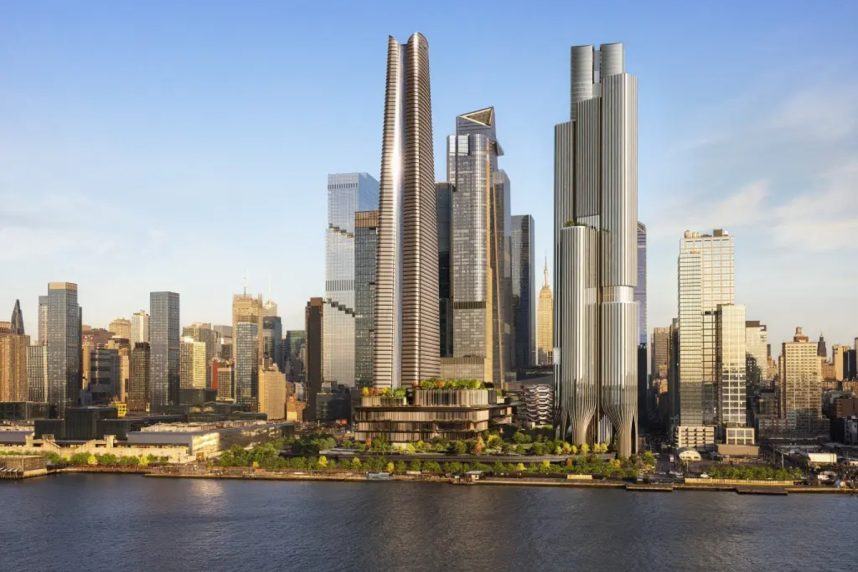|
Getting your Trinity Audio player ready...
|
The Heated Battle for NYC’s Casino Licenses: Stakes, Contenders, & Community Concerns
Edited by: TJVNews.com
As New York City’s sweltering summer progresses, the competition for three coveted city casino licenses intensifies. With proposals and the substantial $1 million application fees due by August 31, the stakes are incredibly high, with billions of dollars on the line, as was recently reported by The New York Post. The decision on who will secure these licenses is expected by late 2025, marking the culmination of an intense, high-stakes process.
Among the contenders, Resorts World New York City in Queens and Empire City in Yonkers, both operating profitable electronic gaming facilities, are seen as front-runners. However, the remaining six contenders face significant local opposition. According to the information provided by The Post, a political insider highlighted the immense lobbying efforts underway, noting, “Companies are spending millions on lobbyists, and no part of the city wants a new casino.”
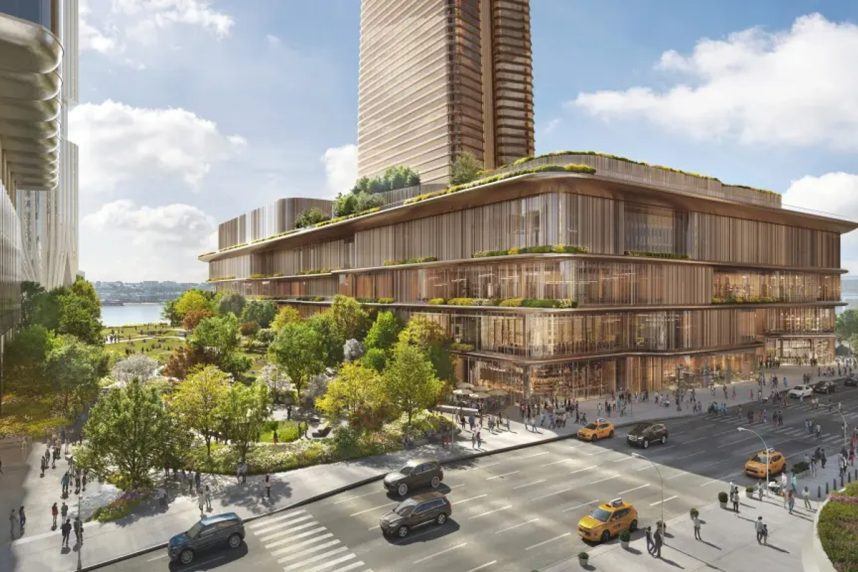
The High Rollers: Key Contenders
Stephen Ross and Wynn Resorts
Budget: $12 billion
Public Bonus: 5.6-acre park, public school
Proposed Casino: Wynn New York City
Set to be located in the glimmering Hudson Yards, Wynn New York City aims to offer a luxurious experience, featuring an 80-story hotel and casino along with high-end restaurants. The Post report said that according to Michael Weaver, Chief Communications Officer of Wynn, the plan is to create a “destination resort” that will integrate with the city’s existing shows, sporting events, and concerts. Notably, in-house live entertainment is not part of their strategy, ensuring a symbiotic relationship with the city’s cultural scene.
However, the proposal has met with resistance from Community Board 4. The board’s primary concern is the significant reduction in promised housing units. Initially, Stephen Ross’s Related Companies had committed to providing 5,700 housing units, but the casino plan would reduce this number to 1,507, as per in the information contained in The Post report. Bennett Liebman, former deputy secretary on gaming and racing under Andrew Cuomo, questioned the project’s ability to pass the community review board. The Post report added that in response, Andrew Rosen, Related’s Chief Operating Officer of Hudson Yards, reassured that the commitment to affordable housing would be honored, emphasizing, “We promised 324 units of affordable housing. We will put up the 324 units. The community has not yet seen what we are doing.”
The drive to secure one of the three casino licenses is not just a financial gamble but a socio-political one as well. Each contender must navigate a complex web of community concerns, political lobbying, and stringent regulatory scrutiny. The promise of substantial economic benefits, including job creation and increased tourism, must be balanced against potential social costs and the displacement of local residents.
The primary concern among communities is the potential negative impact of new casinos on their neighborhoods. Issues such as increased traffic, higher crime rates, and the social costs associated with gambling addiction are at the forefront of local opposition. Furthermore, the displacement of promised housing units, as seen in the Hudson Yards proposal, exacerbates fears about affordable housing shortages in an already expensive city.
As New York City gears up for a high-stakes battle over three lucrative casino licenses, the competition is fierce and the stakes are enormous. With proposals and the hefty $1 million application fees due by August 31, contenders are pulling out all the stops to secure these coveted licenses. Billions of dollars hang in the balance, and the decision, expected by late 2025, will significantly impact the city’s economic and social landscape.
MGM Resorts International
Budget: $3 billion
Public Bonus: Tripling the local workforce
Proposed Casino: Empire City
Odds for Approval: Even money
MGM Resorts International, which owns iconic properties like the Bellagio in Las Vegas, aims to secure a full gaming license for Empire City Casino at Yonkers Raceway, as was detailed in The Post report. The racino introduced slot-machine-style gaming in 2006 and has been a successful venture. MGM purchased the racetrack and casino for $850 million in 2018 and now plans a significant 301,200 square foot expansion.
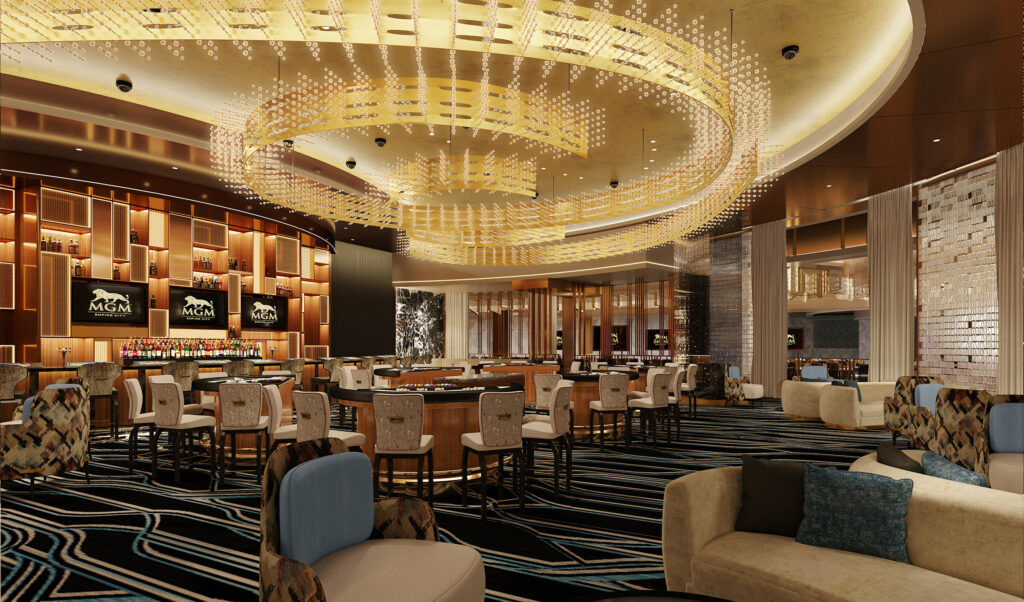
Mitchell Moss, professor of urban policy and planning at NYU, views MGM’s proposal as a clear favorite due to its established record of success. According to The Post report, Woinski echoed this sentiment, stating, “They should already be licensed. They’ll generate tax dollars in six months” through gaming tables even as the expansion proceeds. MGM’s strong operational track record and potential for quick revenue generation make it a compelling choice.
The process to award these licenses involves rigorous evaluations by local review boards and state authorities. Proposals will be scrutinized not only for their economic benefits but also for their alignment with community needs and sustainable development practices.
The decision, due by late 2025, will not only shape the future of New York City’s gaming industry but also its economic and social fabric. With billions at stake and intense competition, the outcome of this high-stakes battle remains eagerly anticipated by all stakeholders involved.
In the high-stakes competition for New York City’s coveted casino licenses, Stefan Soloviev and Mohegan Sun have emerged as a dark horse contender with their ambitious $10 billion proposal for Freedom Plaza, The Post report explained. Despite offering significant public amenities, their Midtown East project faces substantial local opposition and skepticism from key stakeholders.
The Proposal: Freedom Plaza
Budget: $10 billion
Public Bonus: 6.7 acres of green space, the Freedom Museum (featuring Soloviev’s personal pieces of the Berlin Wall)
Proposed Casino: Freedom Plaza
Soloviev and Mohegan Sun’s vision for Freedom Plaza includes a vast entertainment district with a subterranean casino, a hotel with 1,200 rooms, and 1,325 apartments, 513 of which are designated for below-market rents. Additionally, The Post report said that the project promises 6.7 acres of green space and the Freedom Museum, which will showcase significant artifacts, including pieces of the Berlin Wall from Soloviev’s personal collection.
Despite the ambitious scope and potential benefits, the proposal has attracted significant opposition from the local community. Concerns range from ethical issues related to gambling to the potential social impacts on vulnerable populations. The Post reported that one community member dismissed the potential gambling profits as “blood money,” reflecting deep-seated ethical concerns.
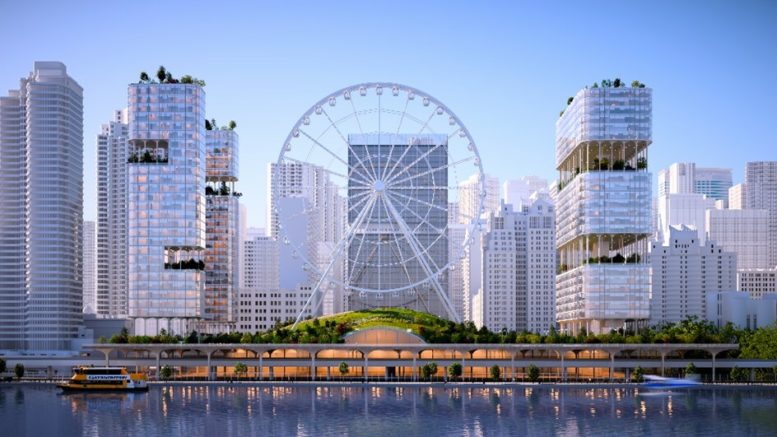
Robert Gottheim, district director for Rep. Jerry Nadler, voiced worries about the impact on vulnerable residents, fearing they might squander their paychecks on gambling. Additionally, The Post report said that Mitchell Moss criticized the project’s location, arguing that a casino near the Queens Midtown Tunnel does not fit the neighborhood’s character.
Undeterred by the criticism, Soloviev has defended the project, emphasizing that the casino is only a minor component of a broader entertainment district. “The subterranean casino is only a small part of the entertainment district we’re putting in,” he told The Post. “I think they will like it once it is done.” Soloviev’s confidence highlights his belief that the project’s overall benefits will ultimately win over skeptics.
Despite Soloviev’s optimism, experts remain skeptical about the project’s chances. Alan Woinski, president of the casino consultancy Gaming USA, pointed out Soloviev’s lack of experience in the casino industry as a significant hurdle. “He has no experience [with a casino],” Woinski told The Post, adding that the recent split between Mohegan Sun and Virgin Hotels in Las Vegas further complicates their bid. This separation, which neither party has fully explained, raises questions about Mohegan Sun’s current standing in the casino management sector.
Odds for Approval
Odds for Approval: 50 – 1
Given the substantial community opposition, the strategic concerns raised by urban planning experts, and the inexperience highlighted by industry insiders, the odds are stacked against Soloviev and Mohegan Sun, as was observed by The Post. Their bid is seen as a long shot, with significant obstacles to overcome if they hope to secure one of the highly sought-after licenses.
As the race for New York City’s three highly sought-after casino licenses heats up, Genting Group emerges as a formidable contender with its ambitious $5 billion proposal for Resorts World New York City. This racino, operating since 2011, is already a significant player in the industry, claiming the title of America’s highest-performing non-tribal casino outside of Las Vegas, despite not offering table games like blackjack and roulette, as per the information in The Post report. The potential for expansion and immediate revenue generation positions Resorts World NYC as a strong candidate, but recent controversies and community concerns pose potential hurdles.
The Proposal: Resorts World New York City
Budget: $5 billion
Public Bonus: Over 10 acres of green space
Proposed Casino: Resorts World New York City
Genting Group’s proposal focuses on transforming Resorts World NYC into a full-fledged casino, capitalizing on its existing infrastructure and success. The plan includes significant public benefits, such as more than 10 acres of green space, aiming to enhance community engagement and support.
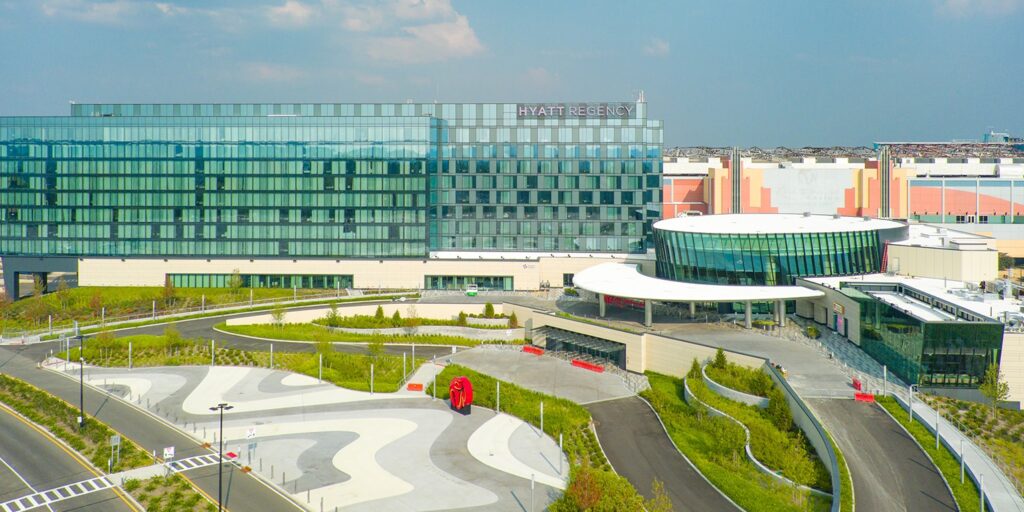
Meghan Taylor, Senior Vice President of Government Affairs and Public Relations for Resorts World NYC, emphasized the project’s readiness to deliver immediate benefits. “We’ll be able to flip cards within six months,” she told The Post, highlighting the rapid revenue generation potential through gaming tables, which could significantly boost tax income for the city.
However, the bid faces potential setbacks due to a scandal involving allegations that the translator for Los Angeles Dodgers’ baseball star Shohei Ohtani gambled with bookies who parked money at Resorts World in Las Vegas. Nelson Rose, a gambling law expert, commented on the severity of the issue, noting that “one of the standards for casino licensing is reputation,” as was reported by The Post. Such allegations, even if indirectly related, could cast a shadow over the licensing process.
In response, Taylor clarified the distinction between Resorts World Las Vegas and Resorts World New York, stressing that they are separate entities with no overlap in senior management. This separation aims to mitigate concerns regarding the scandal’s impact on their bid in New York.
Despite the controversy, industry experts remain optimistic about Genting Group’s chances. Alan Woinski suggested that the property’s proven success and immediate revenue potential make it a strong contender. He remarked to The Post, “If there was an issue related to Vegas, there would have been a hearing on the slot machines at Resorts World NYC. This property is going to be a fantastic casino.” Given these factors, the odds for approval are considered even money.
The proposal’s inclusion of over 10 acres of green space is a significant public benefit, aligning with broader community and environmental goals. This green space could serve as a valuable community asset, providing recreational areas and enhancing the local environment, The Post report said. Moreover, the casino’s expansion is expected to create numerous jobs, further boosting the local economy.
As the battle for New York City’s three lucrative casino licenses intensifies, Bally’s Corporation has entered the fray with a $3 billion proposal to develop Bally’s Bronx. This ambitious project aims to transform portions of the Bronx Links golf course into a casino, hotel, and spa complex, the report in The Post said. Despite the bold vision and strategic location, the proposal faces substantial financial and legislative challenges, casting doubt on its feasibility.
The Proposal: Bally’s Bronx
Budget: $3 billion
Public Bonus: Police substation within the gaming facility
Proposed Casino: Bally’s Bronx
Bally’s Corporation’s proposal seeks to repurpose parts of the Bronx Links golf course, which it acquired from Donald Trump in 2023, into a comprehensive casino complex. Indicated in The Post report was that the plan includes converting the course’s parking lot and practice range, both of which are considered parkland, into the casino site. Additionally, the project promises to enhance public safety by incorporating a police substation within the gaming facility, a notable public benefit aimed at garnering community support.

A significant hurdle for Bally’s Bronx is the need for “parkland alienation,” a special legislative permission required to convert parkland for non-park uses. Lawmakers in the Bronx have yet to endorse this plan, leaving Bally’s in a precarious position. The requirement for parkland alienation adds a layer of complexity and uncertainty, making it challenging to gain the necessary approvals.
Community reception to the project has been lukewarm. Locals have expressed concerns about the potential impacts of a casino in their neighborhood, ranging from increased traffic and noise to potential social issues related to gambling, as was noted in The Post report. These concerns further complicate Bally’s efforts to secure local and legislative support.
Despite these challenges, Christopher Jewett, Senior Vice President of Corporate Development at Bally’s, remains optimistic about the project’s prospects. When speaking to The Post, he emphasized the strategic advantage of Bally’s Bronx’s location, situated between two potential casino sites operated by MGM and Resorts World. “Assuming that MGM and Resorts are layups, we’re right between them,” Jewett told The Post. “We’re the best location in terms of not diluting anyone else’s revenue.”
Jewett’s argument hinges on the idea that Bally’s Bronx could complement rather than compete with the other casinos, thereby maximizing overall revenue potential without cannibalizing the market, the Post report added. This positioning, he believes, makes their proposal a valuable addition to the city’s gaming landscape.
However, the financial viability of Bally’s Bronx has come under scrutiny. Alan Woinski pointed out the company’s substantial debt and recent financial losses as significant red flags. “Bally’s is stretched financially,” Woinski noted when speaking to The Post, referring to the company’s billions in debt and a $172 million net loss in 2023. “I would ask if they are sure they want to do a project of this size.” This skepticism is echoed by shareholders, who have raised similar concerns about the company’s ability to undertake such a large-scale project given its current financial state.
Odds for Approval: 60 – 1
Given these financial and legislative challenges, the odds of Bally’s Bronx securing one of the coveted casino licenses appear slim. The need for parkland alienation, combined with financial instability and community opposition, places the project at a significant disadvantage compared to other contenders.
In the competitive race for New York City’s three new casino licenses, Steve Cohen, in collaboration with Hard Rock International, has presented an $8 billion proposal for a grand casino project dubbed Metropolitan Park. Known for his ability to secure high-profile acquisitions, from Damien Hirst’s iconic shark artwork to the New York Mets, Cohen’s latest endeavor is characterized by a blend of luxury and entertainment. However, despite the project’s allure, significant legislative challenges stand in its way, according to the information provided in The Post report.
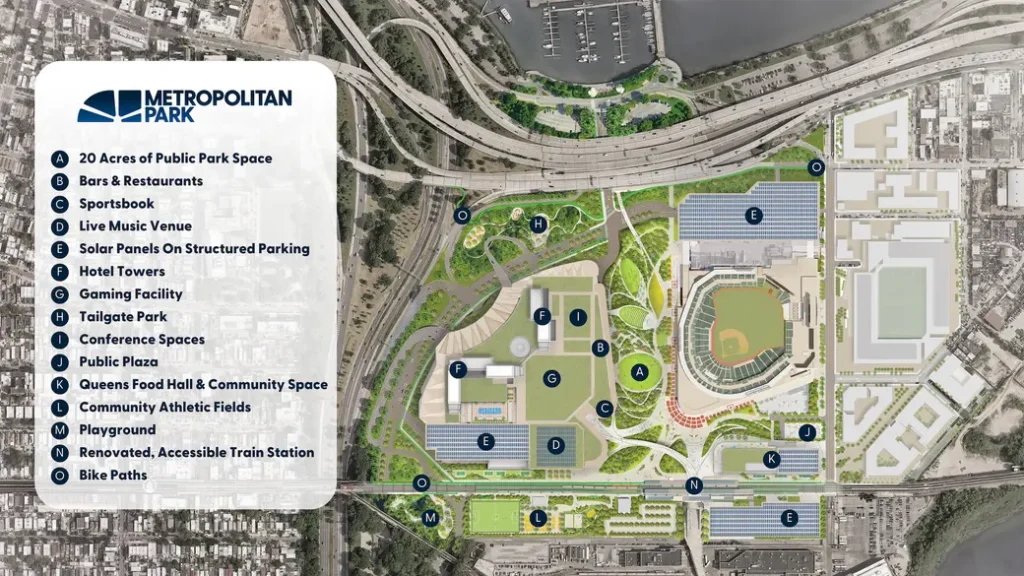
The Proposal: Metropolitan Park
Budget: $8 billion
Public Bonus: 25 acres of new park space
Proposed Casino: Metropolitan Park
Steve Cohen’s vision for Metropolitan Park includes a state-of-the-art casino, an expansive food hall, a luxury hotel, and a premier music venue. The Post reported that the project promises substantial public benefits, most notably the creation of 25 acres of new park space, aimed at enhancing community engagement and recreational opportunities. A source close to the project described it to The Post as “a once in a lifetime opportunity.”
Despite the ambitious scope and potential public benefits, Cohen’s proposal faces significant hurdles, primarily related to the issue of parkland alienation. State Senator Jessica Ramos has taken a firm stand against the project, explicitly stating that she “will not introduce legislation to alienate Cohen’s property for the purposes of a casino,” The Post report said. This legislative barrier mirrors the challenges faced by Bally’s Corporation in their Bronx casino bid.
Undeterred by Ramos’s opposition, sources affiliated with Cohen’s project have indicated that they are exploring “multiple pathways to secure required approvals.” The Post report explained that these pathways may involve seeking alternative legislative support or finding ways to address the community and environmental concerns that underpin the opposition to parkland alienation. However, overcoming such entrenched resistance will require substantial political acumen and strategic negotiation.
Despite the project’s potential benefits, industry experts remain skeptical about its chances of approval. Alan Woinski highlighted the difficulties in swaying public opinion on gambling. “If a person doesn’t approve of gambling, you can’t convince them otherwise,” Woinski told The Post,adding, “I don’t see any way around Ramos.”
Odds for Approval: 25 – 1
Given the staunch opposition from key legislative figures and the broader community resistance to gambling-related projects, the odds for Cohen’s Metropolitan Park securing a casino license are currently low, The Post observed. Overcoming these challenges will require not only navigating complex political landscapes but also effectively addressing the underlying concerns of local stakeholders.
As the decision-making process progresses, the ability of Cohen and his team to navigate these challenges and secure necessary approvals will be critical. The outcome will depend on their capacity to engage with and persuade key stakeholders, address community concerns, and demonstrate the project’s overall benefits to the city. With current odds standing at 25 – 1, Cohen faces an uphill battle, but his track record suggests he may yet find a way to turn this ambitious vision into reality.
In the heated race for New York City’s three casino licenses, a consortium led by Thor Equities, Chickasaw Nation’s Global Gaming Solutions, Saratoga Casino Holdings, and Legends Hospitality Group has proposed a $3 billion project to transform Coney Island, according to The Post report. Dubbed “The Coney,” this ambitious plan seeks to revive one of the city’s oldest entertainment districts by blending nostalgia with modern gaming and entertainment. However, The Post reported that despite its potential, the project faces significant challenges, particularly from local opposition and complex stakeholder dynamics.
The Proposal: The Coney
Budget: $3 billion
Public Bonus: Year-round Skee-Ball
The Coney aims to create a unique destination that pays homage to Coney Island’s storied past while introducing a state-of-the-art casino. The proposal includes a mix of traditional Coney Island attractions on the ground floor, such as Skee-Ball and other arcade games, with the casino situated on the upper floors, the report in The Post said. This integration aims to preserve the area’s historic entertainment vibe while injecting new economic life into the community.
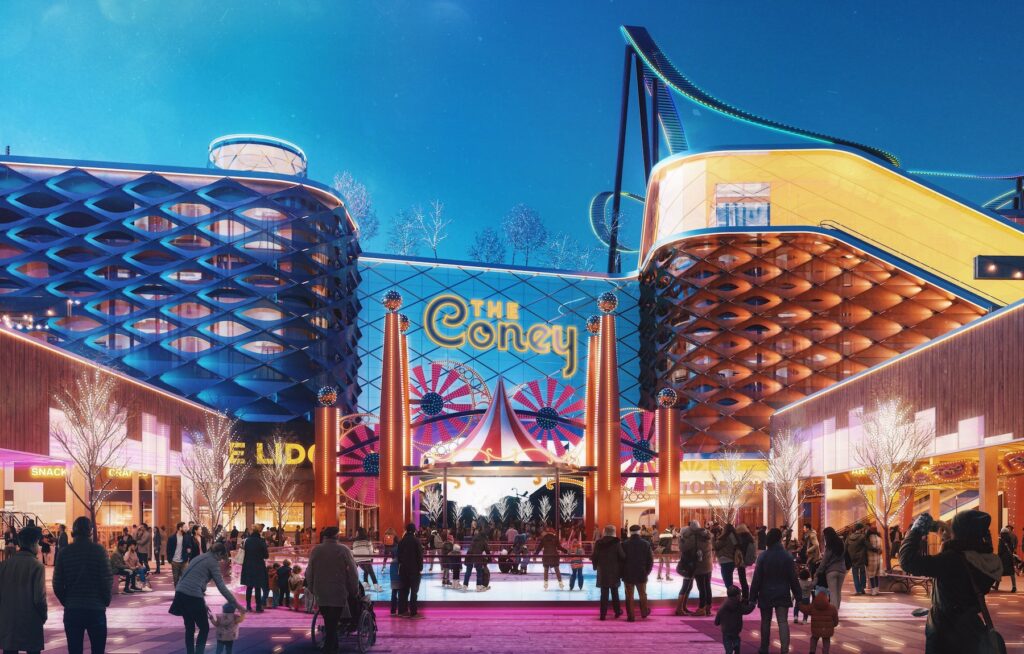
Despite the project’s nostalgic appeal, it faces substantial opposition from local stakeholders. Last year, the local community board voted against the casino proposal, citing fears that Coney Island could suffer the same fate as Atlantic City, where casinos led to economic blight rather than revitalization, as was explained in The Post report. These concerns highlight the delicate balance required to ensure that new developments benefit the community without exacerbating existing issues.
Robert Cornegy, a project consultant and former New York City Council member, remains optimistic about the project’s potential. He emphasized the team’s commitment to incorporating community needs and integrating traditional Coney Island attractions with the casino. “We are incorporating the community’s needs. We’re putting in Coney Island attractions on the ground floor and the casino upstairs,” Cornegy told The Post. He also pointed out that Coney Island has been under-invested in for years, suggesting that The Coney could bring much-needed economic revitalization that might not be as impactful in more affluent areas like Manhattan.
While the vision for The Coney is clear, the path to realization is fraught with challenges. Alan Woinski expressed skepticism about the project’s feasibility, given the number of stakeholders involved. “I like this project, but there are so many hands in it. I don’t think they have what it takes to bring this in,” Woinski commented to The Post. The complexity of managing a consortium of diverse entities, each with its own interests and operational style, adds a layer of difficulty to the project’s execution.
Odds for Approval
Odds for Approval: 40 – 1
Given the current landscape, the odds of The Coney securing one of the casino licenses are relatively low. The project must navigate substantial local opposition, address community concerns effectively, and streamline its consortium’s operations to present a cohesive and compelling case to the decision-makers.
Despite the opposition, proponents of Caesars Palace Times Square remain optimistic. Brett Herschenfeld, Executive Vice President of Retail and Opportunistic Investments at SL Green, believes the project will benefit the entire Times Square area. “Caesars Palace Times Square is a project designed to uplift all of these Times Square businesses through investment and shared economic benefit,” Herschenfeld told The Post.
The involvement of Jay-Z, a globally recognized figure, adds a unique dimension to the proposal. In December 2022, a source close to the project suggested that Jay-Z could oversee residencies similar to those in Las Vegas, such as Adele’s, enhancing the entertainment offering and drawing significant crowds.
However, logistical challenges remain a significant hurdle for the project. Alan Woinski pointed out the practical difficulties of operating a casino in Times Square. “There is no convenience in Times Square,” Woinski told The Post. “The best way to get there is on the subway. Do you want to ride there with $5,000 in your pocket?” These concerns about accessibility and security add another layer of complexity to the proposal.
Odds for Approval: 25 – 1 (Potentially 10 – 1 with local approval)
Given the current landscape, the odds of Caesars Palace Times Square securing a license are relatively low. The project faces significant community opposition, logistical challenges, and a complex approval process. However, if the proponents can secure local approval and effectively address the concerns raised, the odds could improve to 10 – 1.


